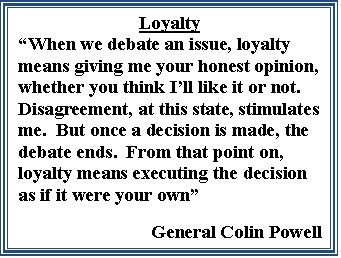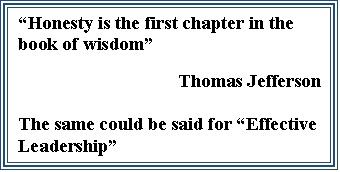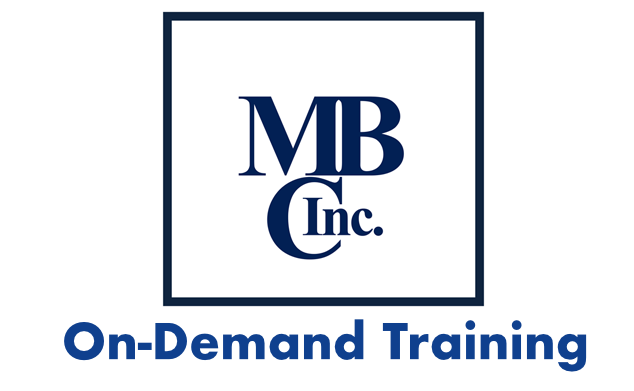Find the Rules for Picking People!
In General, Powell’s Terms “Powell’s Rules for Picking People”
“How will you accomplish great deeds? Only by attracting the best people,” says Colin Powell.
Such an obvious statement, so difficult to accomplish. CEO’s across the board of top companies attest to this position. Bill Gates, Michael Dell and others attribute success to attracting the best people and retaining them.
Powell’s rules for recruiting and promoting
From Oren Harari’s book “The Leadership Secrets of Colin Powell”
“Look for intelligence and judgment and, most critically, a capacity to anticipate, to see around corners. Also look for loyalty, integrity, a high energy drive, a balanced ego and the drive to get things done.”
How to accomplish this critical task of selection, attempted by many very good people, effective leaders, and HR experts have tried and often failed to make appropriate selections. Let me tell a short story about people selection. A major automobile manufacturer had a job opening for a position of “Process Control Engineer”. Someone to examine federal safety and environmental regulations and ensure the product design and manufacturing met all the requirements and had all the required documentation. The manager assigned this task, interviewed several people and finally made a selection. The person selected had no manufacturing experience, no design experience, and limited experience in consumer goods. I got the chance to talk to the person that made the final decision and ask her about her selection criteria. I was surprised with the response; I felt it would be difficult to justify her selection. I was told, “The women I selected had served as a very effective and efficient federal compliance officer for a gambling casino.” My response was “so”. She responded M*** had excellent grades in college, this confirms intelligence and work ethic as well as time management as she had to work two jobs to put herself through college. She was active in student activities and served on several boards addressing student enrichment, curriculum, and student aid. As a compliance officer for a casino, she had to read, decipher, understand, implement, and comply with very complex federal regulations of the gambling industry. Her references showed she not only accomplished these tasks but also excelled at them. She created policies that enable her work to spread to other casinos within the parent corporation. As it turned out, she was a very successful Process Control Engineer for this particular automotive manufacturer. The criteria had not been past experience in the automotive industry. The criteria had been; intelligence, work ethic, ability to understand complex regulatory requirements, develop internal procedures, implement the standards, outstanding communication skills and the ability to work with a diverse team.
The story here is “think outside the box”, to the max. The attributes of success are not only, limited to or just job specific, often the attributes are much broader in nature. Look for intelligence, work ethic, exceptional ability to see a new way, energy and courage. Bill Gates has been found to say, “Even if there is no specific job for them at the moment, hire them anyway. With guidance from leaders they will define their own job and good things will happen.”
“Intelligence and Judgment” Colin Powell puts these two words together as inseparable. Intelligence alone is unacceptable, the proper people will also have judgment that comes from experience, focus and involvement with and for a diverse team or organization. You must never try to accept intelligence as “judgment” these two are distinct and separate attributes. Many intelligent people lack judgment. Judgment without life experience is insufficient in itself; this is not to say you cannot hire anyone that does not already have work experience. Life experience comes from many forms, school, sports, community activity, clubs, project work and many other sources. Life experience supports and guides judgment but life experience in itself does not bring judgment. It is always a combination of factors.
“Loyalty” is not shielding the boss from undesirable information or protecting the boss from unseemly conditions, it is not ‘kissing-up’ or the display of some other unnecessary frivolous support. Loyalty often means arguing with the boss; conflict can be very stimulating to an organization. Conflict is not always disruption; conflict can produce a healthy environment of debate, expanding a good idea into an exceptional idea. Conflict managed by the team brings great strength. Conflict in this context is not envy, ego, self-righteousness, my-way or any other self-centered attribute.
‘kissing-up’ or the display of some other unnecessary frivolous support. Loyalty often means arguing with the boss; conflict can be very stimulating to an organization. Conflict is not always disruption; conflict can produce a healthy environment of debate, expanding a good idea into an exceptional idea. Conflict managed by the team brings great strength. Conflict in this context is not envy, ego, self-righteousness, my-way or any other self-centered attribute.
“Integrity” few things are valued higher by General Powell than personal integrity. The great resumes, list of degrees, etc. if the individual is weak on integrity it may result in poor decisions that only support the  current office politics, are expedient or are what the individual thinks the boss wants to hear. Intelligence without integrity does not produce the type of leader that most organizations desire. Leaders lead in all aspects of the business. If you expect people to display ethical attributes, then pick people that have strong ethical values and have developed a personal direction they are committed to upholding. When you find such people and their personal commitments match the organization’s commitments then you will have found compatible ethical goals. This is the best of all worlds.
current office politics, are expedient or are what the individual thinks the boss wants to hear. Intelligence without integrity does not produce the type of leader that most organizations desire. Leaders lead in all aspects of the business. If you expect people to display ethical attributes, then pick people that have strong ethical values and have developed a personal direction they are committed to upholding. When you find such people and their personal commitments match the organization’s commitments then you will have found compatible ethical goals. This is the best of all worlds.
“Drive and Balanced Ego” do not select or promote people that only wait for ‘orders-from-above’, find those that are driven, set their own personal goals above and beyond the formal goals of the organization. People that do not complain about workload, whine about pressure or are distressed about ‘my-plate-is-to-full’. “Ego” Leaders do not need to hide their strong ego or defend the fact that they are and have been successful, ego is good but should not be defining. Find those that have balance in their life, a balanced ego does not seek self importance, a balanced ego gives and shares credit, a balanced ego is concerned with the objective of the team or organization not with self-gratification.
“Powell Principles – By Oren Harari”
- Hire primarily on talent and values, not just on resumes: Resumes, by definition, describe past performance
- When seeking talent, look for the key Powell traits in hiring and promoting.
- Seek value alignment.
- Hire individuals who are better than you are and individuals who can compensate for your weaknesses.
- As a leader, apply these same attributes to yourself.
There are three books I recommend as reading to everyone that is interested in understanding the principles of leadership.
- The Leadership Secrets of Colin Powell by *Oren Harari
- The Powel Principles by *Oren Harari
- It Worked For Me – In Life and Leadership by “Colin Powell”
Please talk with your peers and see if they would benefit from this series. If you think they may, please send them to the web site www.mbcincorp.com they may download the free white paper and be automatically signed up to receive all future leadership articles and quality tips.
Thanks to All
Bill Martin – President
MBC, Inc.

